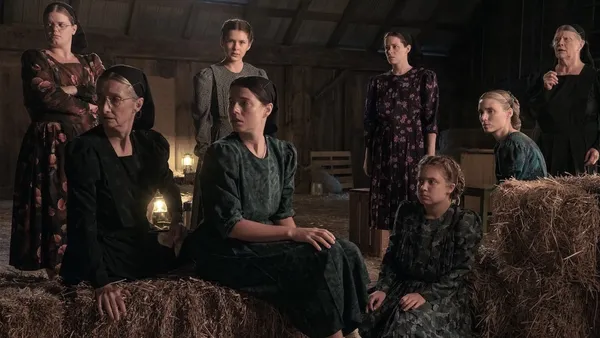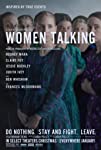Eye For Film >> Movies >> Women Talking (2022) Film Review
Women Talking
Reviewed by: Jennie Kermode

Women are vulnerable in isolated communities built upon patriarchal ideas. The case in Bolivia which inspired Miriam Toews’ novel and subsequently this film adaptation was shocking but hardly unique – indeed, there may be cases which never come to light precisely because it is so hard for the victims to articulate their situation or reach outside help. 130 women and girls in the Manitoba colony were raped repeatedly between 2005 and 2010 by at least seven men. Because they were drugged with horse tranquiliser, they struggled to understand what had taken place, and were told that they had been subject to demonic attacks. In their case there were men who were not involved, who eventually took action to defend them by calling in the police – but what if there had not been.
The title of the book and film speaks to underlying difficulties facing such victims. Talking about trauma is notoriously difficult, especially in a culture of shame, especially where women do not have words for parts of their own bodies, or are afraid to speak them. Mennonite cultures like this one traditionally encourage female silence. It is more vital here, however, because these women have been denied the opportunity to learn to read. They cannot write about what has happened to them. They can keep no records and send no messages.
The film begins when certain conversations have already happened – when enough whispers have been shared for each of the women to realise that they are not alone, and for the men to realise that the women know, and that their claims about the supernatural no longer carry weight. The rape of a toddler has proven to be the last straw, driving one of the women to violence and resulting in police intervention. Leaving the colony in order to arrange bail (it is dramatically convenient but rather unlikely that all the men have chosen to go, bar the women’s one ally and a trans man whose gender only the women recognise), the men have given the women an ultimatum: forgive them completely or face eternal damnation. The women now see themselves as having three options: stay and do nothing, stay and fight, or leave.
There is little time. This ought to ramp up the tension, but many viewers will simply find it frustrating – having decided to go with one of the latter two options, the women keep talking, with nobody dispatched to make preparations for either. It’s realistic, perhaps, but distracting, as one half expects the men to come back and find them still helpless, despite their claim to be taking action. One must allow that these are inexperienced decision-makers, never having had authority over their own lives. With a little help from August (Ben Whishaw), who was away when the attacks occurred and has the benefit of a college education, they establish a debating structure centred on three prominent families in whom the others are willing to place their trust. Each of these has been particularly badly affected by the men’s actions. One member of the group, Mariche (Jessie Buckley), has also experienced severe domestic violence, and does not let them forget the threat which they still face.
Although most of the action takes place inside a barn, Polley chose to shoot the film with a wide aspect ratio and highly polished aesthetic, ensuring that we are aware of the women’s existence within a vast, unknown world which is only now coming to life for them. The impact of this is somewhat reduced, however, by her decision to mute the colours. This is beautifully done and carries meaning of its own, recalling old photographs from the days when far more US women lived this way. It carries us back, psychologically, into he past, even as the film’s theme manifests as intensely contemporary. The difficulty resulting from it is one which affects the film more widely. Polley has crammed in a lot of good ideas, but they cannot all usefully share the same space. Keeping some aspects of the film simpler would have made it more powerful.
The most important aspect of the film is not really the incidents in the women’s past, or the action they will go on to take. It is not the substance of the discussion, but their ability to engage in discussion at all, and the psychological changes which they undergo as a result. Polley has assembled a stellar cast which includes some of the most capable actors working today, but the ensemble approach inevitably leaves some of them sidelined, and there is a feeling of talent being squandered. The film is very stagey and that feeling of artificiality undermines the experience of watching the women engage with something which must feel differently unnatural to them.
There is a lot of repetition. This is entirely natural in the course of such discussions, but is it really necessary for Polley to show so much of it? Though the film runs to more than two hours, we are not actually there from dusk till dawn, so a little more judicious editing would be quite reasonable. The most interesting parts of the discussion centre on the women’s wrestling for adequate means of expression, their efforts to draw on religious language and ideas to fill the gap, and their struggle to reconcile the men’s betrayal with their continued religious belief and so find morally congruent solutions. Major ethical and emotional questions arise around the fate of male children raised in that toxic environment. The presence of a trans man, meanwhile – someone who has discovered himself without needing access to any established social narrative – gives the women the chance to reflect on their own habitual policing of gender roles.
Polley is a tremendously capable filmmaker still very much in the process of finding her voice, and the flaws in this film often mirror those of its characters as they, too, go about exploring their potential and discovering their power. Dealing with the not-quite-thereness of it requires patience, but it is thrilling to imagine what the next stage of this process might be.
Reviewed on: 07 Jan 2023

















